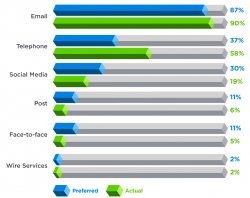Note to PRs: Journalists prefer social media
PRs listen up: UK Journalists prefer to be contacted via social media, according to the 2013
Social Journalism Survey from Cision and Canterbury Christ Church University.
According to the results, a third (30%) of respondents chose social media as preferred source of communication with PRs. Younger journalists in particular had a higher preference than older professionals, and so did broadcasting and online journalists compared with those in print.
Interestingly, social media is the third most common platform used by PRs to communicate with journalists after e-mail and telephone (see graph). However, a number of variables influence social media usage patterns. For example, the study finds online journalists are much more likely to be contacted through social media, with 35% naming social media as one of the two most common ways that PR practitioners contact them. This compares to 12% for newspaper journalists and 9% for magazine journalists.
The patterns were also indicative of the type of journalism in question , with non-news journalists more likely to be contacted through social media. 34% of reviewers and 39% of editorial journalists chose social media as one of the two most common ways PR practitioners contacted them, while the figures for hard-news and soft-news journalists were 6% and 25% respectively.
While social media’s relevance as a platform for communication between PRs and journalists undoubtedly gains momentum with each year, the study indicates that the channel does not seem to have a significant impact on the extent to which journalists rely on PR professionals. Respondents were split when asked whether they are less reliant on PR professionals because of social media: 39% disagreed, 36% agreed and 26% were not sure.







Leave a Comment
Trackbacks & Pingbacks
[…] RT @lauracrimmons: Wouldn't expect that> Note to PRs: Journalists prefer social media – Cision UK http://t.co/dqO0QHYBkZ via @CisionUK […]
[…] un quadro abbastanza completo di quel che accade in Gran Bretagna. Lo fa riprendendo una recente indagine online di Cision e Canterbury Christ Church University, cui hanno partecipato 589 […]